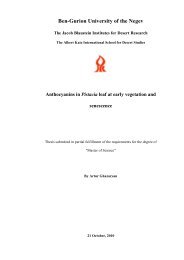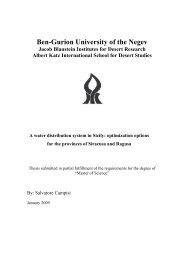CHARACTERIZATION OF DESERT DATE (Balanites aegyptiaca)
CHARACTERIZATION OF DESERT DATE (Balanites aegyptiaca)
CHARACTERIZATION OF DESERT DATE (Balanites aegyptiaca)
You also want an ePaper? Increase the reach of your titles
YUMPU automatically turns print PDFs into web optimized ePapers that Google loves.
annum, Phytolacca tetramera, and Panax notoginseng were also reported to have<br />
antifungal activities (Woldemichael and Wink, 2001; Escalante et al., 2002; Iorizzi et al.,<br />
2002).<br />
A study of the literature also revealed that saponins reduce larval growth and cause<br />
mortality in the flower beetle, Tenebrio molitor (Adel et al., 2000), European grape moth,<br />
Lobesia botrana (Tiva et al., 1992), and European corn borer, Ostrimia nubialis (Nozzolillo<br />
et al., 1997). Studies have also reported that the high saponin content cultivar of alfalfa<br />
(Medicago sativa L.) is correlated with resistance to the pea aphid (Acyrthosiphon pisum)<br />
(Pedersen et al., 1976).<br />
Nutritive properties<br />
In the past, saponins were recognized as antinutritional constituents due to their adverse<br />
effects, such as toxicity to fish and cold blooded animals and haemolytic effects, however,<br />
recent studies have shown that saponins are beneficial to humans. In high concentrations,<br />
saponins impart a bitter taste and astringency; however, recent studies have shown that<br />
saponins possess hypocholesterolemic, immunostimulatory, and anticarcinogenic properties<br />
(Carrol and Kurowska, 1995; Kenarova et al., 1990; Kikuchi et al., 1991). Saponins are also<br />
considered natural antioxidants since they bind to cholesterol and prevent cholesterol<br />
oxidation in the colon (Shi et al., 2004).<br />
Extracts of the saponin-containing plants like Yucca schidigera and Quillaja saponaria<br />
have been reported being used for various food applications since time immemorial (Price<br />
et al., 1987). The beneficial effects on human and animal health of supplementation with<br />
saponin-rich extracts have also been documented (Anthony et al., 1994). The US Federal<br />
Drug Administration has also designated Yucca and Quillaja saponin-rich extracts safe for<br />
human consumption (Sen et al., 1998). It has been suggested that the prime reasons for the<br />
beneficial effects of saponin-rich extracts was the influence of antimicrobial activities of<br />
the saponin compound present in the extracts. It has also been reported that growth<br />
inhibition of different bacteria occurred when used against Y. schidigera in the gut (Van<br />
Nevel and Demeyer, 1990). Sen et al. (1998) found growth inhibition of E. coli by extracts<br />
of Q. saponaria and Y. schidigera.<br />
9

















